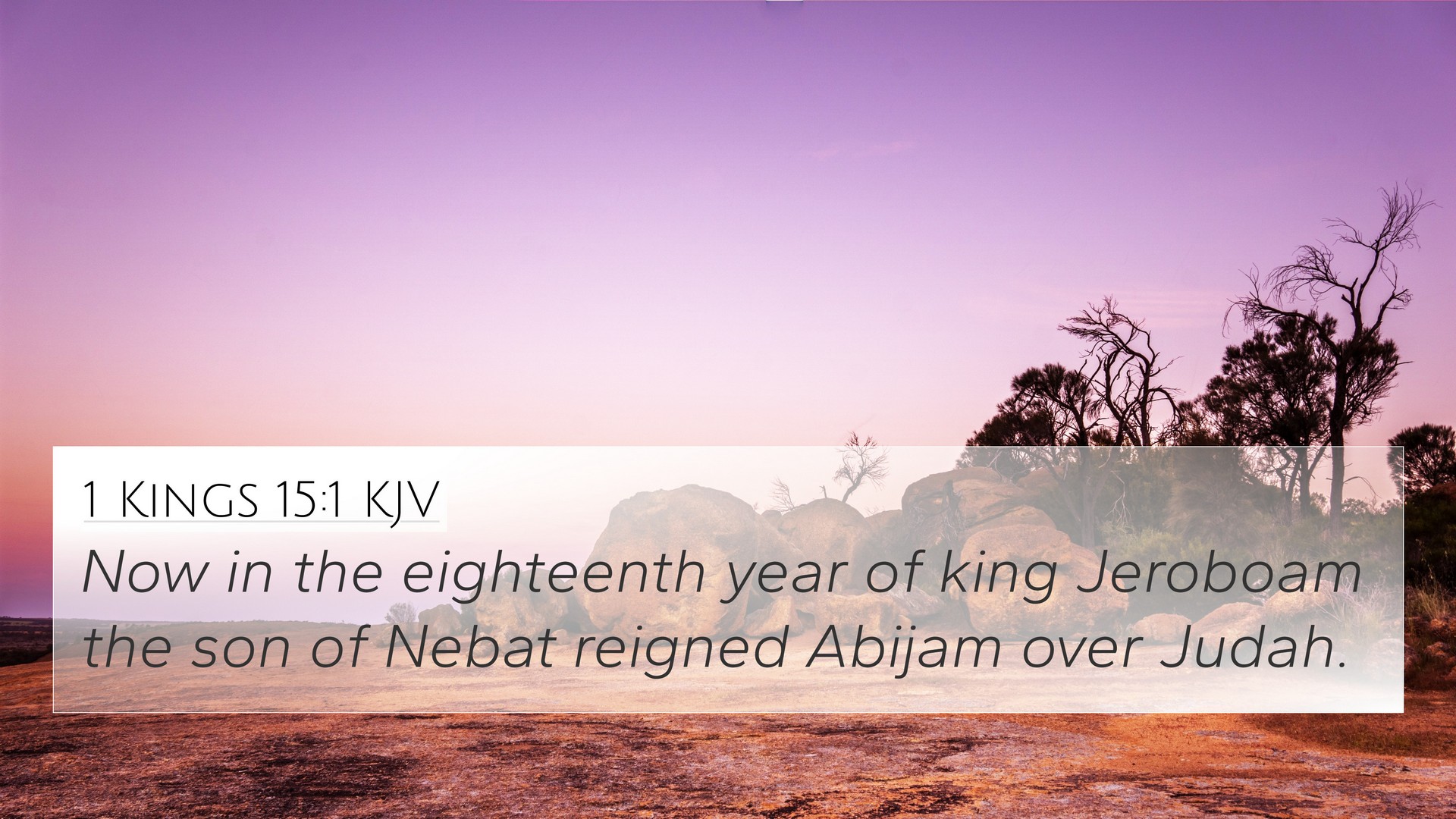Understanding 1 Kings 15:1
Verse: "Now in the eighteenth year of King Jeroboam, the son of Nebat, reigned Abijam over Judah." (1 Kings 15:1)
Contextual Background
The verse introduces Abijam (also known as Abijah) as the king over Judah during the reign of Jeroboam in Israel. This period is characterized by a divided kingdom, where the northern kingdom of Israel and the southern kingdom of Judah have separate kings. Understanding this historical context is crucial for further interpretations.
Commentary Insights
The insights from various public domain commentaries shed light on different aspects of this verse:
-
Matthew Henry: Emphasizes Abijam's lineage and the implications of his reign as a continuation of the Davidic line. He points out that despite being a descendant of David, Abijam did not emulate his forefather's righteousness.
-
Albert Barnes: Focuses on the political dynamics of the time, linking Abijam's reign to the broader conflicts between Judah and Israel. He mentions that the timeline indicates a significant history of tension between the two kingdoms.
-
Adam Clarke: Analyzes the implications of Abijam's rule, particularly regarding the sinful practices that persisted during his reign. Clarke notes that this verse sets the stage for understanding the spiritual decline of Judah during this era.
Thematic Connections
The verse connects several key themes in the Bible:
-
Leadership and Legacy: The mention of Abijam's reign highlights how leadership can be influenced by heritage, and how past decisions affect future generations (see 1 Chronicles 3:10-12).
-
Covenant and Kingship: Abijam's position as king ties back to God’s covenant with David, illustrating the divine promise despite human failure (refer to Psalm 89:34-37).
-
The Nature of Kingship: This verse can be cross-referenced with passages dealing with the qualifications and character of kings, such as Deuteronomy 17:14-20.
Cross-References
Here are some Bible verses that relate to 1 Kings 15:1:
- 1 Kings 14:31 - Discusses the reign of Abijam's father, Rehoboam, providing context to Abijam's lineage.
- 2 Chronicles 13:1-2 - Covers Abijam's actions and conflicts during his reign.
- 1 Kings 14:20 - Relates to the ongoing rivalry between Jeroboam and the kingdom of Judah.
- 2 Samuel 7:12-16 - God's promise to David regarding his lineage and its relevance to Abijam's kingship.
- Jeremiah 22:30 - Prophetic implications about the house of David, of which Abijam was a part.
- 1 Kings 15:3 - Continues the narrative of Abijam's wickedness, showing parallels in moral failings among kings.
- 1 Kings 15:12 - Discussing the reforms (or lack thereof) initiated in Abijam's reign.
Song of the Kings
The history of kings in Israel and Judah serves not just as a record but as a profound reflection on the impact of leadership on the people of God. The decisions made by each king resonate throughout Scripture, demonstrating the importance of righteousness and faithfulness to God's covenant.
Conclusion
1 Kings 15:1 offers a snapshot of a critical juncture in the history of Israel and illustrates the ongoing themes of legacy, leadership, and divine fidelity. The study of this verse, including its cross-references, can facilitate a deeper understanding of the narrative and theological implications within the broader biblical text.
Tools for Further Study
For those interested in exploring more about cross-referencing in the Bible, consider utilizing various tools for effective study:
- Bible Concordance: A valuable resource for finding verses based on keywords.
- Bible Cross-Reference Guide: Helps in identifying connections between verses quickly.
- Cross-Reference Bible Study: Methods for deepening your understanding of how scriptures relate to one another.




